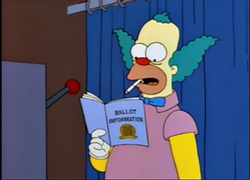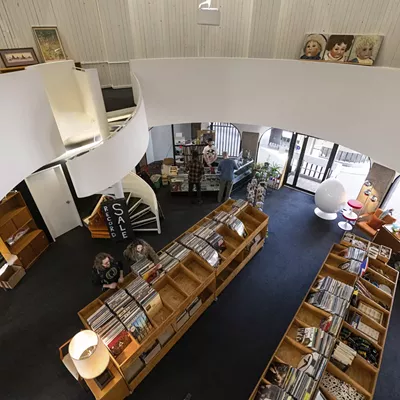Thursday, October 20, 2016
How movies and TV shows boost a conspiracy-minded "rigged!" mentality

The Simpsons
You say the election can't be rigged against Trump, but then how come the Springfield election was rigged against Sideshow Bob opponent Joe Quimby? Huh? Didn't think about that, didja?
The big headline made by the debate last night, beyond the claim that nobody respects nasty women more than Donald Trump, was that Trump would not promise to concede the election if — and let's be honest, probably when — he loses.
No spoilers, the TV showman promises. You'll have to wait for the series finale to see what zany stuff he'll do if he loses.
This, of course, comes after more of
It's turned into a blame game between liberal and conservative pundits, with many arguing that a presidential candidate making claims that the election would be rigged before the election is unprecedented, and many conservatives citing the Diebold voter machine conspiracies in 2004 and noting that Al Gore did not exactly concede immediately after the razor-tight 2000 election.
In some ways, this is the extension of the long debate over voter fraud, where the contention that voter fraud is essentially non-existent butts up against the argument that illegal non-citizen votes may have given us the Affordable Care Act.
Of course, Trump is talking about something far
But it's a mistake just to look at your Infowars and your World Nets Daily when it comes to understanding why so many people buy into the notion of
On the great sixth season Simpsons episode, celebrity-turned-felon Sideshow Bob
Meanwhile, on the less-than-great Season 20 "Treehouse of Horror" episode of The Simpsons, Homer tries to vote for Barack Obama, but the electronic voting machine stubbornly counts his vote as a vote for John McCain. In other words, it's almost exactly the sort of scenario that Trump surrogate Jeffrey Lord was ranting about on CNN. Rigged!
And it's not just comedy. On the second season of Shonda Rhimes' breathless
Twelve Colonies Vice President Gaius Baltar had a pretty big lead over President Laura Roslin on Battlestar Galactica. But when the Zephyr ballots are counted, Roslin pulls ahead, taking the lead over the Cylon-manipulated Baltar. Turns out, they had a plan. Col. Saul Tigh had helped replace a ballot box with a stuffed one in order to make Roslin president. Rigged!
It happens in movies too. In Man of the Year Robin Williams plays a comedian who hosts a Daily Show-style TV
Turns out —Man of the Year spoilers — the voting machines the election took place on had a huge error, and the voting machine company goes to incredible and illegal lengths to attempt to cover it up. Rigged!
There are plenty of other examples of course. TV Tropes has a whole "Vote Early, Vote Often" section dedicated to ballot-stuffing plotlines.
Conspiracy theories are common in fiction, and for good reason: Real life tends to be messy, random and pointless. Fiction tries to give it order. It raises up villains for heroes to defeat. It tries to imbue the mundane with meaning.
Fiction often becomes the connecting yarn on the humanity's crazy conspiracy corkboard.
So in the Da Vinci Code, the Catholic Church has assassins carrying out a cover-up stretching back two millennia. So on 24, terrorist acts are sometimes an inside job, sometimes carried out by the president, other times by the vice president. So in Captain America: Winter Soldier, the agency fighting the bad guys turns out to be filled with bad guys themselves.
Heck, Oliver Stone's JFK was based on actual events, which it twists and prods and squeezes in order to make into a conspiracy thriller.
By contrast, how many conspiracy theories in movies turn out to be completely baseless? Occasionally, you'll get a conspiracy loon character used as
TV is TV, movies are movies and fiction is fiction. But the ideas in fiction have their way of worming into our perception of reality.
Most people don't wake up automatically buying Alex Jones' conspiratorial rants about how the government is poisoning water to turn frogs gay. We have to be primed by the culture around us.
In his book, The United States of Paranoia: A Conspiracy Theory, Reason's Jesse Walker describes how during the 1970s, real
Revelations in the real world had given popular culture a darker, more skeptical tone. Now pop-culture paranoia was expanding Americans’ framework for discussing real-world events. Like Mae Brussell’s Jonestown fantasy, the conspiracy thrillers weren’t just fiction. They were myth.There are conspiracies. There are cover-ups. But in real
They happen in small towns like Bell, California, where, until the LA Times stumbled upon it, a city manager was paying himself nearly $1.5 million in salary.
In other words, conspiracies rarely happen when everybody's paying attention. They tend to happen when no one is.
Tags: Conspiracy theories , Television , Election 2016 , Arts & Culture , Image , Video























